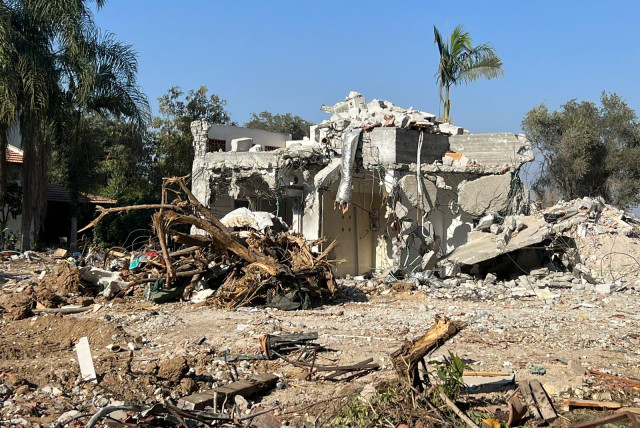Released Hamas hostage on 60 Minutes: Objecting to anything could be death sentence

Doctors saw signs that hostages were branded, held in handcuffs, and sexually abused.
In a Sunday broadcast of CBS's 60 Minutes news interview program, former Hamas hostage Yarden Roman-Gat recounts her terrifying experience being captive in Gaza. Her husband, Alon Gat, describes their experience on October 7 and his time during the 54 days before her release.
The segment opens with a visit to Alon’s parents’ home in Kibbutz Be’eri, which was turned to rubble. On October 7, his wife and their three-year-old daughter Geffen were visiting his parents when Hamas stormed the kibbutz, broke into their home, and shot Alon’s 69-year-old mother to death. His sister Carmel disappeared, and Hamas took Alon, Yarden, and their daughter into a car and drove off.
When the car approached a small army post, the Hamas terrorists stopped the car and hid in the trees because a tank was passing them. Yarden and Alon took the opportunity to run out of the car with their daughter. Alon took Geffen from Yarden and hid with her for nine hours while Yarden was recaptured by the terrorists and taken to Gaza.
She was driven through thick celebratory crowds. “My kidnappers could not help themselves, showing me off as a trophy and showing my face as an object. I was not a person,” she says.
Yarden was taken to a house where she was surrounded by guards constantly. “You cannot object to anything. It could cost you your life,” she says. She was given a "hijab" that covered most of her body. She described her situation as “helpless.”
There were details of her captivity she did not want to discuss with the interviewer regarding food.
She also described the frightening experience of being in a war zone. She said, “You cannot ignore it. It’s very intense.”
The mother of another hostage was interviewed
Romi Gonen’s mother, Meirav, says it is October 7 every day for her.
“They’re not fed," Meirav said, "they are starved. We know about sexual harassment of the women that left there - and of the men also. They’re treated with cruelty, the ones that stay there. And it's important to understand that they don’t have time.”
Meirav’s daughter, Romi Gonen, was taken captive from the party at Kibbutz Re’im, where she was shot. She remains in Gaza.
Families of those still being held captive have created an encampment across from the Defense Ministry, trying to put pressure on the Israeli government to facilitate the safe return of the remaining hostages, the 60 Minutes segment reported. Meirav sleeps in this encampment, known as the "Hostage Square."
Interview with Sheba Medical Center doctor
In the same 60 Minutes episode, Dr. Itai Pessach from Sheba Medical Center was interviewed. He examined several of the hostages upon their release back to Israel.
He recounts that all hostages had been abused psychologically and physically in Gaza. Many of the released hostages did not know that their homes were destroyed or that they had lost family members, so the teams at the hospital had to deliver the tragic news.
Pessach reveals that doctors saw signs that hostages were branded, held in handcuffs, and sexually abused. He also reveals that they were told that they were “alone” and that “nobody cares” about them.
In addition, the doctor discussed that there are testimonies of family members being separated within Gaza as a form of psychological torment.
At the end of the interview, Pessach says that now, “unfortunately we are the world experts in receiving people that were hostages.”
Jerusalem Post Store
`; document.getElementById("linkPremium").innerHTML = cont; var divWithLink = document.getElementById("premium-link"); if (divWithLink !== null && divWithLink !== 'undefined') { divWithLink.style.border = "solid 1px #cb0f3e"; divWithLink.style.textAlign = "center"; divWithLink.style.marginBottom = "15px"; divWithLink.style.marginTop = "15px"; divWithLink.style.width = "100%"; divWithLink.style.backgroundColor = "#122952"; divWithLink.style.color = "#ffffff"; divWithLink.style.lineHeight = "1.5"; } } (function (v, i) { });


